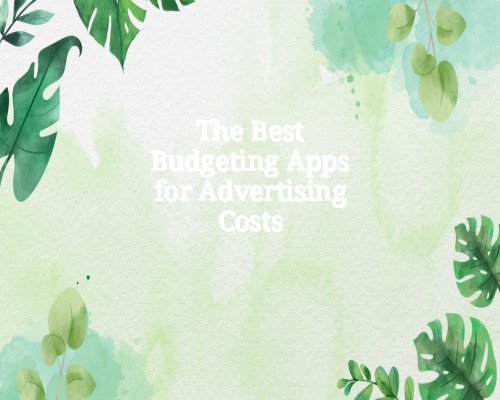The Best Budgeting Apps for Advertising Costs
Easily track and control your advertising expenses with these top budgeting apps designed to help marketers, businesses, and entrepreneurs stay profitable.
Why Budgeting for Advertising Is Crucial
Effective advertising can drive traffic, leads, and conversions—but without a proper budget, it can just as easily drain your resources. Whether you’re running Facebook ads, Google PPC campaigns, or influencer partnerships, keeping track of your advertising costs is key to maximizing ROI.
Budgeting apps can simplify this process by offering real-time insights, automated expense tracking, and performance analytics tailored to marketing expenses. Below is a comprehensive list of the best budgeting apps specifically optimized for managing advertising costs.
1. QuickBooks Online
Streamline Ad Expense Tracking with Built-In Automation
QuickBooks is a household name in business finance. For advertisers and marketers, it offers seamless integration with bank accounts and platforms like Google Ads, making it easy to automatically import advertising transactions.
Key Features:
-
Automatic syncing with advertising platforms
-
Customizable ad spend categories
-
Real-time financial dashboards
-
Forecasting and budgeting tools
-
Tax-ready reports for advertising deductions
Best For: Small to medium-sized businesses managing multiple ad platforms.
2. Xero
Manage Advertising Costs with Precision
Xero is another powerful accounting software with excellent budgeting capabilities for advertising. Its intuitive dashboard and integrations with marketing tools provide detailed visibility into ad spend.
Key Features:
-
Real-time budget tracking
-
Integration with CRM and ad management tools
-
Multi-currency support for global ad campaigns
-
Graphical reports for expense analysis
-
Budget-to-actual comparisons
Best For: Agencies and startups with international advertising efforts.
3. Mint
Ideal for Freelancers and Solopreneurs on a Budget
Mint isn’t designed solely for businesses, but its personal budgeting features can be cleverly adapted for solo marketers and freelancers who need to track advertising costs within a tight budget.
Key Features:
-
Free to use
-
Visual breakdown of advertising expenses
-
Customizable categories and alerts
-
Mobile app for on-the-go budgeting
-
Historical data and trends for ad spend
Best For: Independent marketers or side hustlers managing simple ad budgets.
4. Zoho Books
Flexible Budgeting with Marketing-Specific Tools
Zoho Books is part of the larger Zoho suite and integrates well with marketing platforms and CRMs. This makes it a great option for businesses that want a holistic view of advertising ROI.
Key Features:
-
Project-based budgeting
-
Integration with Zoho CRM and Campaigns
-
Schedule and automate reports for ad performance
-
Real-time cash flow tracking
-
Invoice tracking and expense categorization
Best For: Businesses using Zoho for both CRM and financial tracking.
5. You Need a Budget (YNAB)
A Goal-Oriented Approach to Advertising Budgets
YNAB focuses on assigning every dollar a job, which is perfect for marketers who want complete control over how advertising dollars are allocated. It’s especially useful for those managing recurring ad campaigns.
Key Features:
-
Zero-based budgeting method
-
Custom ad spend categories
-
Goal tracking for campaign performance
-
Bank syncing and secure encryption
-
Reporting that highlights overspending
Best For: Marketers who want to closely align spending with campaign goals.
6. Float
Real-Time Cash Flow and Ad Budget Forecasting
Float isn’t a standalone budgeting tool; it’s a cash flow forecasting add-on for accounting software like Xero and QuickBooks. It excels at helping marketers plan ad budgets based on projected revenues and cash flow.
Key Features:
-
Visual cash flow forecasting
-
Integration with accounting tools
-
Scenario planning for ad campaigns
-
Drag-and-drop interface
-
Real-time syncing of advertising expenses
Best For: Businesses needing predictive insights to plan ad budgets efficiently.
7. Tiller Money
Spreadsheet-Based Budgeting with Automation
If you love spreadsheets but hate manual updates, Tiller is the perfect bridge. It connects to Google Sheets and Excel, then auto-populates your advertising expenses and transactions.
Key Features:
-
Automated spreadsheet updates from bank feeds
-
Ad expense categorization
-
Customizable templates for ad budgeting
-
Historical tracking and trend analysis
-
Secure access through Google and Microsoft accounts
Best For: Data-driven marketers and spreadsheet power users.
8. Wave
A Free Option for Managing Ad Costs
Wave is a free accounting and budgeting software that’s ideal for startups and small businesses. While it lacks some advanced features, it’s sufficient for tracking basic ad spending.
Key Features:
-
Ad spend categorization
-
Invoicing and receipt scanning
-
Bank connection for transaction import
-
Easy-to-read dashboards
-
Integration with payment processors
Best For: Beginners and businesses seeking a no-cost solution.
9. Plannuh
Marketing Budget Software Tailored for Advertisers
Plannuh is purpose-built for marketing teams and is arguably one of the best platforms for managing complex ad campaigns across multiple channels.
Key Features:
-
Marketing-specific budget templates
-
ROI and performance tracking
-
Team collaboration features
-
Cross-platform campaign tracking
-
AI insights and budget recommendations
Best For: Marketing departments and agencies handling multiple client campaigns.
10. PocketSmith
Forecast Advertising Budgets with Ease
PocketSmith provides robust forecasting features that help marketers plan out advertising costs over months or years, adjusting to seasonal trends or campaign changes.
Key Features:
-
Forecasting up to 30 years
-
Scenario modeling
-
Advertising budget timelines
-
Automated expense importing
-
Mobile app access
Best For: Marketers with long-term advertising strategies.
How to Choose the Right Budgeting App for Advertising
When selecting a budgeting app for advertising costs, consider these key factors:
Integration with Advertising Platforms
Choose tools that integrate with Google Ads, Facebook Ads, LinkedIn, or whatever channels you use. This reduces manual input and improves data accuracy.
Custom Categories and Tagging
Ad-specific categories or tags help you isolate marketing costs from other business expenses, allowing more targeted reporting.
Real-Time Reporting
You need up-to-date insights to optimize campaigns on the fly. Real-time dashboards allow you to react quickly if a campaign starts to underperform.
Collaboration Features
If you’re working with a team or agency, make sure the app supports multi-user access and permissions, especially for approving budget changes.
Pricing and Scalability
Start with a free or low-cost option if you’re a small operation. As your campaigns scale, consider apps with advanced forecasting and integration features.
Best Practices for Budgeting Advertising Costs
To get the most out of any app, follow these best practices:
1. Set Clear Budget Limits
Always allocate a specific amount for each campaign and channel. Use your app to enforce spending caps and receive alerts when limits are exceeded.
2. Track ROI, Not Just Spend
Budgeting isn’t just about managing expenses—it’s about improving returns. Compare ad costs with conversions and sales to understand what’s truly working.
3. Review Weekly or Bi-Weekly
Advertising environments change quickly. Reviewing your ad budget frequently helps you pivot when necessary.
4. Use Historical Data
Leverage data from past campaigns to inform future budgets. Most apps provide year-over-year comparisons or custom reports.
5. Allocate Based on Performance
Shift budget dollars from underperforming channels to high-converting ones. Let data, not guesswork, dictate your allocations.
Final Thoughts
Budgeting apps for advertising costs are essential tools for anyone running paid campaigns—from solopreneurs to full-scale marketing teams. Whether you need simple expense tracking or advanced forecasting, there’s a solution for every need and budget. Choose the right one, implement good budgeting habits, and watch your advertising ROI improve month over month.

